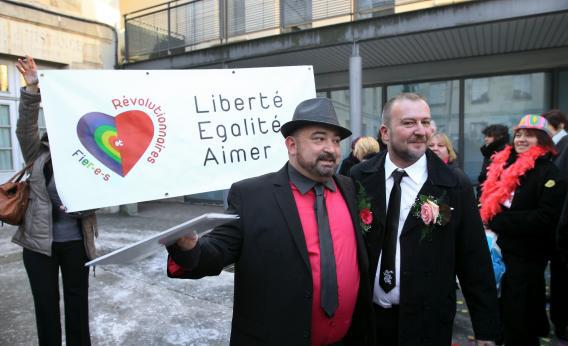French legislators have a law in the works that bans mother and father from all official documents. They are preparing to collapse the male/female binary into a gender-neutral totality. If the law passes, parent will replace the two terms wherever they appear in France’s civil code. Now would be an excellent time for a semiotics joke, if semioticians hadn’t already deconstructed jokes.
The proposed law is not really about linguistics—it’s about gay rights: It would legalize gay marriage and grant adoption rights to gay couples. “Marriage is a union of two people, of different or the same gender,” it declares.
Other, less uplifting declarations have followed. “Gay marriage would herald a complete breakdown in society,” French Catholic Church Cardinal Philippe Barbarin warned the Christian’s RFC radio station. “Afterward they will want to create couples with three or four members. [Speaking of linguistics, Cardinal: A couple equals two people.] And after that, perhaps one day the taboo of incest will fall.”
I talked to Vivian Curran, a law professor at the University of Pittsburgh, about what the law would actually mean for French society. Aside from the main thrust of it—the transfer of marriage and adoption rights to gay couples—there are 382 parts of the French Civil Code that would likely be amended, mostly having to do with torts and family law. For instance, Article 56 of Book I states, “The birth of a child shall be declared by the father, or, in absence of the father, by the doctors of medicine or surgery, midwives, health officials or other persons present at the delivery; and, where the mother has given birth outside her domicile, by the person at whose place she has given birth.” Replacing all those “mothers” and “fathers” with parents may not fundamentally alter the spirit of the code, but it does make a difference: Now, it seems, a mother—insofar as she is also a parent—can legally declare the birth of her own child. Long time coming.
Curran referenced, too, the presumption of paternity when a baby is born. Under the current French code, there is a legal obligation to be faithful in marriage. So the legal system assumes that the husband of the mother is also the father of the child. Of course, sweeping aside mother and father in favor of parent dispenses with the idea of paternity altogether. Does this matter? The draft law’s supporters claim that it does not, but critics aren’t so sure.
As for the gay marriage issue, progressive French socialists have wanted to let same-sex couples tie the knot since at least 2002. In 2004, the mayor Noel Mamere wed two men on the grounds that the civil code didn’t explicitly deny gay people the right to marry. (A court later voided the ceremony.) Unlike that ill-starred wedding, the draft law’s prospects in 2012 look pretty good. French president François Hollande has expressed support for same-sex marriage, and his backers enjoy a majority in Parliament.
Beyond gay marriage, could liquefying the distinction between mothers and fathers—even in this limited way—free up parents to behave differently around their kids? Might dads start acting more nurturing? Moms more stern? Freud might be turning over in his grave, but we should all be interested to see how the passage of the law plays out.
